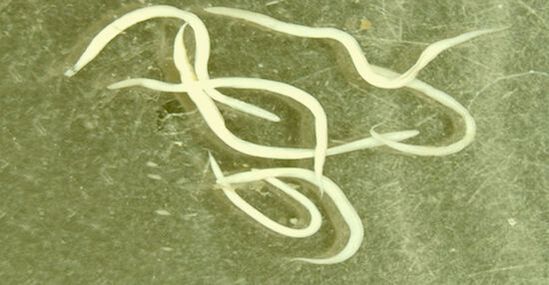
Many people would be surprised if they discovered that a person regularly lives "not alone". On the self, as well as inside the body, microorganisms are constantly present, and without this mutually beneficial coexistence, a person would be seriously ill and unable to survive. So, on the surface of healthy skin, there is a normal microflora that protects the skin from the reproduction of harmful bacteria. In a woman's vagina there is lactobacilli, also known as Dederlein sticks, which form a normally acidic environment. Finally, in the large intestine and feces of a healthy person, there are hundreds of billions of microorganisms involved in the digestion of food, the production of vitamins, and the protection of a person from disease.
But,except bacteria, all other random organisms - protozoa, as well as worms - are parasites. . . Some begin to multiply, "poisoning" our bodies. How to detect parasites in the human body?

This question is far from idle. Of course, if a doctor points and says what parasites live in a certain person's body, then this patient will immediately go for tests. The same would happen if, for example, small worms were accidentally found in fresh feces. The question is clear: the penetration of helminths is obvious. It remains only to clarify the diagnosis and start treatment.
But the parasites have learned to "keep their nose out, " and often their persistence in the body causes puzzling changes that are completely unrelated to the presence of the parasite. . What are these symptoms? How can one suspect, for example, chronic helminthiasis?
General signs of parasites
A whole range of parasites, from accidental (transient), and ending with those that live in the human body continuously, are manifested by a number of symptoms. They can be divided into two groups:
- private(characteristic of a particular parasite), eg, bullous and myalgia with pinworms, development of acute appendicitis with ascariasis, or severe itching in the perianal areasubject when there are pinworms.
But it is good if there is such a symptom that indicates the exact cause of the disease (in medicine it is called pathology) But how to determine the presence of parasites in the human body if there are no signs? such direct signal?
To do this, check for other symptoms that are common for parasites - non-specific.
- no specificSymptoms are signs that the body has been poisoned with waste products of worms and protozoa.
In turn, these signs often present as two syndromes:
- an allergic reaction of the body to the parasite;
- intoxication syndrome, or intoxication.
How to identify parasites in the human body, and what symptoms do they cause?
The most common symptoms of parasitic diseases
- body weight decreases gradually, but steadily, not related to chronic stress, increases the level of physical activity;
- occurrence of insomnia. It can be caused by both skin itching and the release of toxins, for example, during larval migration. In this case, the person feels a decline in health only in the evening and at night.
- the appearance of nausea and vomiting, sometimes due to an aversion to food;
- anorexia, or marked reduction in appetite, up to and including complete absence. For example, with giardiasis, the child is often disgusted with food in the morning;
- showing signs of weakness, weakness, marked decrease;
- daytime drowsiness appears;
- temperature rises to microscopic numbers (37, 1-37. 5);
- have cephalgic syndrome: headache that occurs that is not related to physical or mental stress.

Allergic manifestations of helminthiasis can vary. Urticaria may appear, skin itching may appear and disappear without cause, allergic Quincke's edema, bronchospasm.
In that case,If you or your loved one has the above symptoms, consult your doctor. . .
Of course, this does not limit the range of symptoms, but these are the most common.
About the lab sign
How to identify parasites in the human body with simple tests? For example, when examining the results of a general blood test, the following findings suggest a worm infestation:
- anemia, or decreased hemoglobin levels and color index;
- eosinophilia. . . Normally, the number of eosinophils does not exceed 5%, and their number increases with parasitic diseases.
Of course, you should not arbitrarily do all the tests in a row, the doctor knows better than to prescribe for each specific case.
About accidental finds
Sometimes an accidental finding helps to determine the presence of parasites in the human body. How did this happen?
- for example, with sulphurometry, abnormally dark areas of the lung were found, possibly a parasitic cyst;
- During a brain MRI, one or more single cysts can also be detected, often without any symptoms.
In short, it must be said thatafter detecting these symptoms, a specific diagnosis is made: immune response is established, stool is analyzed, if necessary, duodenal contents are taken. Of course, life history is very important. So, if a day before a person rests in hot countries in Asia and Africa, and swims where it is not recommended, or uses water of uncertain quality, or fruit has not been washed, then most likely helminth infestation.

Likewise, if a child has similar symptoms after attending school, kindergarten, and the parents are certain that the cause is not stress from the influence of an organized group, thenthere are more than enough reasons to see a pediatric patient. infectious disease specialist.
Treatment of helminthic diseases has been identified in a special helminthic (parasite) room, which is normally found in each regional center at the major infectious diseases hospital.





























